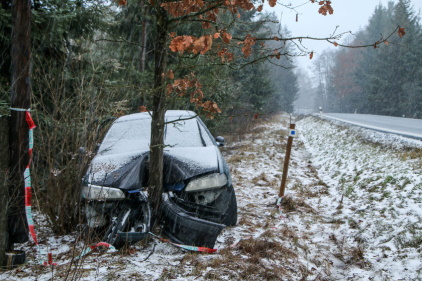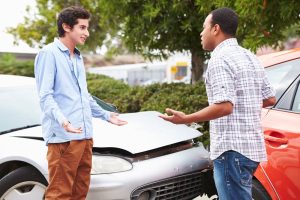The idea of claiming compensation for weather-related accidents may be alien to many people, often discounted as “acts of God”. While there are many occasions where it is difficult, if not impossible, for individuals, companies and local authorities to take action, they still have legal obligations. We will now take a look at some of the major factors affecting the ability to claim compensation for weather-related accidents and personal injuries.
Accidents influenced by weather conditions
When looking at an accident, and resulting personal injury claim, it is important to recognise the responsibilities of all parties. While the detail will vary from case to case, it is crucial to be aware of what may strengthen and what may weaken your case for compensation.
Road traffic accidents in the UK
You would be forgiven for assuming that the majority of road traffic accidents occur in the winter months. While weather does play a major part, the timing and number of road traffic accidents is also influenced by the seasons, with the summer months seeing a significant increase in traffic. However, if you dig a little deeper, you will note the increase in fatal accidents towards the end of the year.
The majority of weather-related car accidents tend to come down to one consideration, the action/non-action of local authorities and individuals. This is directly related to the “reasonable time to act” measure which can often be difficult to challenge. Some of the more common road traffic accidents occur because of issues with:-
Gritting of roads
We all know that local authorities have an obligation to grit roads in times of extreme weather conditions. In recent times we have seen huge improvements in weather forecasting which on the whole allows local authorities to plan to grit in advance. However, there will be scenarios where it is impossible to cover all roads in a very short space of time. Therefore, if you were involved in an accident on an icy road the local authority may be able to refer to extenuating circumstances.
 On the flip side, if your local authority had sufficient time but simply failed to grit roads then those injured as a consequence may have a case for compensation. There is no hard and fast rule regarding timescales, with a number of factors to consider. Consequently, this can be something of a grey area often requiring a legal ruling.
On the flip side, if your local authority had sufficient time but simply failed to grit roads then those injured as a consequence may have a case for compensation. There is no hard and fast rule regarding timescales, with a number of factors to consider. Consequently, this can be something of a grey area often requiring a legal ruling.
Flooding
If a road is flooded to the point where it is dangerous, not only is there an obligation on the local authorities to close the road but drivers need to take responsibility for their own actions. If you attempted to drive through a flooded road, resulting in an accident and injuries to yourself and/or others, you may have trouble claiming compensation.
Firstly, during extreme weather conditions, local authorities will need to prioritise busier roads. This may result in “minor roads” being assessed further down the line and potentially closed. Secondly, if the local authority was able to prove they took action as quickly as possible, it would be challenging to prove negligence.
Falling trees and flying debris
During extreme weather conditions, falling trees and flying debris can prove fatal to motorists, passengers and pedestrians. It is common for local authorities to issue weather warnings in this scenario which are effectively direct instructions to avoid certain areas. There may be occasions where you have no choice but to venture out, but if you venture out by choice then your legal protection will be weakened.
Even without a weather warning, it may be difficult to prove negligence when faced with acts of God. However, there may be occasions where buildings and outside equipment could/should have been “made safe” prior to the extreme weather. There may have been weather-related problems in the past or the potential dangers are obvious to the naked eye. In the event that you were injured as a consequence of flying debris from these areas, you may be able to challenge the building/landowner.
Trips, slips and falls
Whether inside or outside, there are numerous legal obligations placed upon local authorities and property owners. The most common issue involves paths and roads which have not been gritted, leaving vehicles in danger of sliding and pedestrians in danger of slipping and falling. If action should have been taken earlier, and there was a prior warning, then you may have a claim for compensation against the council.
There’s also a legal obligation on property/business owners to ensure that their premises are safe for both employees and customers. Weather-related incidents in these settings tend to involve wet muddy floors which can prove to be a huge hazard. Once a potential danger has been identified, the area must be cordoned off using the traditional warning signs. This is only a short-term fix. It is essential that the area is cleaned and dried as soon as possible to avoid potential injuries.
All parties have responsibilities
The majority of articles covering weather-related injuries and compensation claims tend to focus on the action/non-action of the defendant. As we touched on above, it all boils down to one thing, ensuring that buildings, roads, paths, etc are safe. Unfortunately, many people fail to appreciate that claimants also have legal responsibilities.
Some of the more common personal responsibility failures include:-
- Venturing out in a vehicle or on foot during extreme weather conditions
- Failing to take due care when driving on icy roads
- Failing to avoid areas cordoned off due to danger
- Failure to tread carefully on icy paths
In summary, you need to be aware of your surroundings, potential dangers and do everything possible to avoid them. The idea that you can simply fall back on the liability of third parties is dangerous, especially if your account of the events is embellished in any way.
There will be occasions where both the defendant and the claimant failed to fulfil their legal responsibilities to the letter of the law. In these scenarios, you tend to see what is known as “shared responsibility”. This means that any compensation award would be reduced to reflect the level of liability proved against the defendant. So for example, if the defendant and claimant were equally liable for the accident, the claimant’s compensation would be reduced by 50%.
Summary
When it comes to weather-related issues, many of which are described as “acts of God”, it is important to take responsibility for your own actions. If the local authority issues an extreme weather warning, advising motorists and pedestrians not to travel, take heed. Those who travel do so, to a degree, at their own risk. However, this does not excuse local authorities, councils and business owners from ignoring their responsibilities and failing to ensure the health and safety of third parties.



